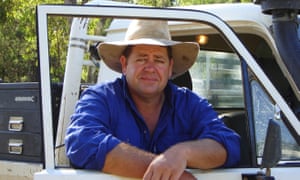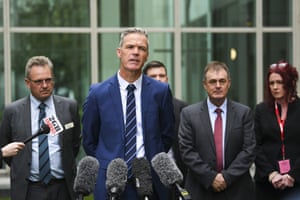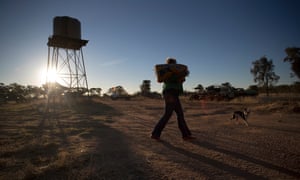The challenge for farmers is how to discuss global warming without scaring people out of food production
The last election may have left the impression with voters that
farmers and rural people in general do not accept climate science
because there was no seismic shift of seats.
Yet this week the agricultural thinktank, the Australian Farm Institute, gathered farmers and their advocacy groups to talk about the impacts of global warming on the already risky business of farming.
Speaker after speaker described how their businesses were trying to deal with increased risk by finding new income streams, changing their cropping and stock management plans and still sometimes being blindsided.
Australia’s largest and oldest continuing pastoral company, AACo, owns 7m hectares of land or roughly 1% of Australia’s land mass.
After the loss of 43,000 head of cattle in record flooding in the Gulf of Carpentaria, AACo boss Hugh Killen’s message to the audience was clear.
“The direct effects of climate are real for us – we come to this discussion with first hand experience and a commitment to find a way forward comes from the heart,” Killen said.
“Slight changes to fire, flood and drought patterns can shift a very delicate balance. Increased flood, drought and fire can disrupt everything we do in their own right, as with risks we have seen in the gulf.
“Changing patterns can also tip the balance in favour of harmful flora and fauna and it can tip the balance away from replenishment of nutrients in the soil.”
He decried the tribal nature of politics and then he urged the room to act and engage on the subject, in spite of the noisy political debate.
“Those who call themselves believers demand action now,” Killen said. “We need to show them we share their conviction about the dangers that we all face.
“They need to know that we care, we take the science seriously and that we are taking action where we can to manage climate risks daily.”
It was an unusual conference because since Tony Abbott dismantled the carbon price in 2013, the largely conservative industry has tiptoed around the issue – a point recognised by the National Farmers’ Federation president, Fiona Simson, last year when she declared climate change was making drought worse.
Long-time climate campaigner and Boggabilla farmer Pete Mailler said there was a “widespread wilful ignorance” about climate change and that was creating the impasse on public policy responses.

Yet this week the agricultural thinktank, the Australian Farm Institute, gathered farmers and their advocacy groups to talk about the impacts of global warming on the already risky business of farming.
Speaker after speaker described how their businesses were trying to deal with increased risk by finding new income streams, changing their cropping and stock management plans and still sometimes being blindsided.
Australia’s largest and oldest continuing pastoral company, AACo, owns 7m hectares of land or roughly 1% of Australia’s land mass.
After the loss of 43,000 head of cattle in record flooding in the Gulf of Carpentaria, AACo boss Hugh Killen’s message to the audience was clear.
“The direct effects of climate are real for us – we come to this discussion with first hand experience and a commitment to find a way forward comes from the heart,” Killen said.
“Slight changes to fire, flood and drought patterns can shift a very delicate balance. Increased flood, drought and fire can disrupt everything we do in their own right, as with risks we have seen in the gulf.
“Changing patterns can also tip the balance in favour of harmful flora and fauna and it can tip the balance away from replenishment of nutrients in the soil.”
He decried the tribal nature of politics and then he urged the room to act and engage on the subject, in spite of the noisy political debate.
“Those who call themselves believers demand action now,” Killen said. “We need to show them we share their conviction about the dangers that we all face.
“They need to know that we care, we take the science seriously and that we are taking action where we can to manage climate risks daily.”
It was an unusual conference because since Tony Abbott dismantled the carbon price in 2013, the largely conservative industry has tiptoed around the issue – a point recognised by the National Farmers’ Federation president, Fiona Simson, last year when she declared climate change was making drought worse.
Long-time climate campaigner and Boggabilla farmer Pete Mailler said there was a “widespread wilful ignorance” about climate change and that was creating the impasse on public policy responses.

“The reality is I can’t stand by and let people glibly talk up agriculture if they are not prepared to start tackling the hard issues now. Because if we set the next generation up to walk off into the sunset and say ‘here you go’, it’s a great opportunity and if we don’t start to tackle these problems now we are setting them up to fail.”
Yet the challenge for farmers and their representative bodies is always how to discuss global warming without scaring people out of food production.
Verity Morgan-Schmidt, of Farmers for Climate Action, said no farmer wanted to be intentionally negative but there was a need to stare the challenges “in the face”.
“It’s a huge step forward for the industry to have such a trusted respected research organisation actively engage on the issue and raise the challenges,” she said. “We all want the industry to have vibrant future but we don’t want to sell people up the river.”
The National Farmers’ Federation chief executive, Tony Mahar, said climate change was increasing risk to the sector through more intense and severe droughts, high water prices, increased volatility of farm income, loss of productive land and relocation of industries.
The NFF declared its “priority ask” was a $1bn eco-systems services fund, following on from a $30m biodiversity stewardship fund announced in the federal election that would develop a framework to pay farmers to improve landscape and capture carbon.

“We are talking about this as the new Landcare and being a system that will recognise, reward, and put a value on some of the systems and services and land management processes that farmers undertake every day, every year, and have done for decades but haven’t been able to get an income stream from that.”
The WWF’s Ian McConnel said farmer payments for eco-system work would be an important driver for positive change.
“We need to reward people when they are adopting practices, especially when those practices don’t come as a win-win to production,” McConnel. “We need to prove there’s a biodiversity measurement. There’s a whole range of challenges around that, but we need to have very good models based on data that says if you do this practice, we see this improvement.”
McConnel said the WWF had already designed farm practices applicable to Germany where farmers could choose from a range of works from restoring wetlands to vegetation connectivity and get paid a premium.
McConnel said while planting and retaining trees was certainly “the easier way” to improve environmental outcomes, capturing soil carbon was potentially a longer term solution for farmers.
The NFF’s $1bn target was “absolutely” achievable, he said, and could come from a mix of government funding and private investors.
“The world needs pretty large-scale investment if we are going to turn the head on biodiversity loss and carbon so we are going to have to see some pretty big investment in that space and I think the willingness is there from both the public and private to invest,” McConnel said.

No comments:
Post a Comment